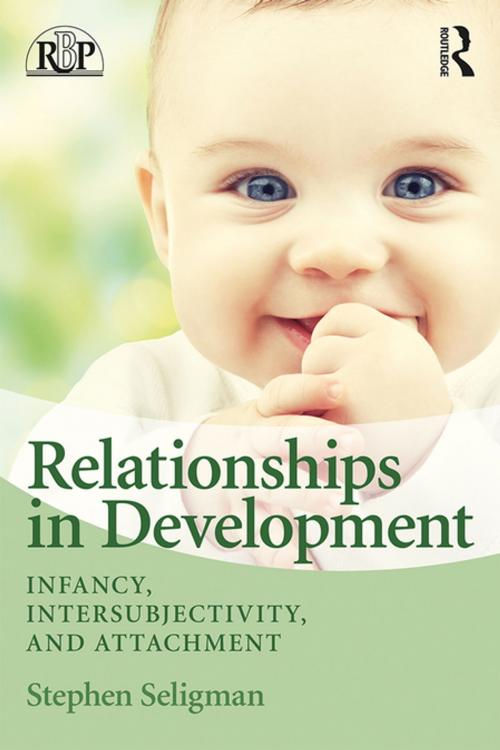Relationships in Development
Infancy, Intersubjectivity, and Attachment
Nonfiction, Health & Well Being, Psychology, Psychoanalysis, Child & Adolescent, Child Development, Mental Health| Author: | Stephen Seligman | ISBN: | 9781136965050 |
| Publisher: | Taylor and Francis | Publication: | November 7, 2017 |
| Imprint: | Routledge | Language: | English |
| Author: | Stephen Seligman |
| ISBN: | 9781136965050 |
| Publisher: | Taylor and Francis |
| Publication: | November 7, 2017 |
| Imprint: | Routledge |
| Language: | English |
The recent explosion of new research about infants, parental care, and infant-parent relationships has shown conclusively that human relationships are central motivators and organizers in development. Relationships in Development examines the practical implications for dynamic psychotherapy with both adults and children, especially following trauma. Stephen Seligman offers engaging examples of infant-parent interactions as well as of psychotherapeutic process. He traces the place of childhood and child development in psychoanalysis from Freud onward, showing how different images about babies evolved and influenced analytic theory and practice.
Relationships in Development offers a new integration of ideas that updates established psychoanalytic models in a new context: "Relational-developmental psychoanalysis." Seligman integrates four crucial domains:
- Infancy Research, including attachment theory and research
- Developmental Psychoanalysis
- Relational/intersubjective Psychoanalysis
- Classical Freudian, Kleinian, and Object Relations theories (including Winnicott).
An array of specific sources are included: developmental neuroscience, attachment theory and research, studies of emotion, trauma and infant-parent interaction, and nonlinear dynamic systems theories. Although new psychoanalytic approaches are featured, the classical theories are not neglected, including the Freudian, Kleinian, Winnicottian, and Ego Psychology orientations. Seligman links current knowledge about early experiences and how they shape later development with the traditional psychoanalytic attention to the irrational, unconscious, turbulent, and unknowable aspects of the mind and human interaction. These different fields are taken together to offer an open and flexible approach to psychodynamic therapy with a variety of patients in different socioeconomic and cultural situations.
Relationships in Development will appeal to psychoanalysts, psychoanalytic psychotherapists, and graduate students in psychology, social work, and psychotherapy. The fundamental issues and implications presented will also be of great importance to the wider psychodynamic and psychotherapeutic communities.
The recent explosion of new research about infants, parental care, and infant-parent relationships has shown conclusively that human relationships are central motivators and organizers in development. Relationships in Development examines the practical implications for dynamic psychotherapy with both adults and children, especially following trauma. Stephen Seligman offers engaging examples of infant-parent interactions as well as of psychotherapeutic process. He traces the place of childhood and child development in psychoanalysis from Freud onward, showing how different images about babies evolved and influenced analytic theory and practice.
Relationships in Development offers a new integration of ideas that updates established psychoanalytic models in a new context: "Relational-developmental psychoanalysis." Seligman integrates four crucial domains:
- Infancy Research, including attachment theory and research
- Developmental Psychoanalysis
- Relational/intersubjective Psychoanalysis
- Classical Freudian, Kleinian, and Object Relations theories (including Winnicott).
An array of specific sources are included: developmental neuroscience, attachment theory and research, studies of emotion, trauma and infant-parent interaction, and nonlinear dynamic systems theories. Although new psychoanalytic approaches are featured, the classical theories are not neglected, including the Freudian, Kleinian, Winnicottian, and Ego Psychology orientations. Seligman links current knowledge about early experiences and how they shape later development with the traditional psychoanalytic attention to the irrational, unconscious, turbulent, and unknowable aspects of the mind and human interaction. These different fields are taken together to offer an open and flexible approach to psychodynamic therapy with a variety of patients in different socioeconomic and cultural situations.
Relationships in Development will appeal to psychoanalysts, psychoanalytic psychotherapists, and graduate students in psychology, social work, and psychotherapy. The fundamental issues and implications presented will also be of great importance to the wider psychodynamic and psychotherapeutic communities.















